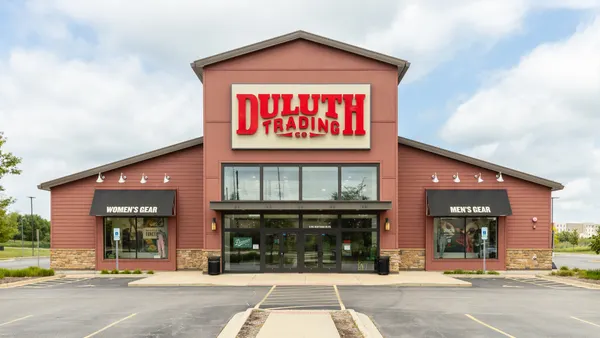Dive Brief:
- What is already expected to be a big peak season in terms of retail sales will likely be bolstered by a new acronym: buy-online, ship-to-store (BOSS), according to a new report from CBRE. The new initiative differs from buy-online, pick-up in-store (BOPIS) as it is not based on store stock, but is fulfilled from a warehouse.
- Nearly one-third of Zara's online orders are picked up in-store, according to the report. At Home Depot, that number is 47%. Still, Macy's, Michaels and Kohl's have all announced new BOSS, with Michaels predicting its combined BOPIS and BOSS programs will make up nearly half of its online sales this peak season.
- "With the newly advanced BOSS program that entices shoppers to retrieve items from the store, retailers can both forego delivery costs and offer more inventory without having to stock it at the store," reads the report.
Dive Insight:
Retailers who have already built omnichannel systems will reap the benefits this holiday season, according to CBRE, since BOSS models really only make sense for retailers with integrated e-commerce and in-store fulfillment.
"Companies that have for one reason or another maintained retail picking and packing separately may not actually be able to do buy-online, ship-to-store," Joe Dunlap, Managing Director of Supply Chain Advisory for CBRE, told Supply Chain Dive in an interview. In a BOSS model, said Dunlap, omnichannel supply chains can simply build on existing systems creating limited disruption for a new consumer benefit.
"The retailer can essentially toss that carton on the back of the truck," joked Dunlap.
For Kohl's, the growth in BOPIS and BOSS has lead to 20% to 25% additional sales, as customers grab extra items to add to their orders once in the store, according to CBRE.
Dunlap said some retailers even use their BOSS programs to nudge consumers into the store or avoid costly parcel shipping by making the pick-up option much more attractive than a high free-shipping minimum purchase.
"In essence, I can influence the consumer to come to the store instead of offering a free channel. Consumers will tend to opt for the free option — then the retailer can also reduce that transportation costs," said Dunlap.
Ship-to-store, over store pick-up for online purchases, offers retailers even more efficiency because picking and packing at the warehouse is generally cheaper than doing so in the store, and the warehouse also has a lower overwhelm point for special items such as the most popular holiday toys. "I can do a lot more volume of BOSS then I can BOPIS," Dunlap explained.
Pre-purchase schemes, whether shipped or picked from the store, take some of the guesswork out of being a consumer and, in the best-case scenario, help to avoid stockouts of popular items. But all of this buying online may not lead to a less-frenzied peak season in-store, said Dunlop.
"We’ll have to wait and see how [retailers] provide their special sales. They’re really looking for foot traffic to generate the broadest basket that the consumer walks out with. It will be interesting to see how many people will honor those offers with ship-to-store the day after," he said.














